|
|
|
Sort Order |
|
|
|
Items / Page
|
|
|
|
|
|
|
| Srl | Item |
| 1 |
ID:
093074
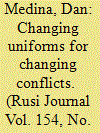

|
|
|
|
|
| Publication |
2009.
|
| Summary/Abstract |
Just as Lawrence of Arabia famously wore indigenous clothing during the Arab Revolt of 1916-18, is it time for British conventional forces in Afghanistan, currently engaged in a non-conventional war, to adopt the uniform of the Afghan National Army? Dan Medina argues that despite the inevitable complications and resistance, the potential benefits of a phased uniform change are too compelling to ignore.
|
|
|
|
|
|
|
|
|
|
|
|
|
|
|
|
| 2 |
ID:
111717
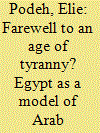

|
|
|
|
|
| Publication |
2012.
|
| Summary/Abstract |
When Hosni Mubarak, looking out of a palace window, saw the demonstrators down below on January 25, 2011, he turned to his advisor and exclaimed: "My God! It's a revolt!" "No, my President," was the answer, "that is a revolution." Well, alright, this legendary quote is usually attributed to French King Louis XVI, on July 14, 1789.1 Yet, judging by the mild response of the Egyptian police forces it is possible that, like his European predecessor, Mubarak did indeed underestimate the significance of the events unfolding before his eyes. The parable draws our attention to the important distinction between a revolt, a takeover and a coup on the one hand, and a revolution on the other.
|
|
|
|
|
|
|
|
|
|
|
|
|
|
|
|
| 3 |
ID:
096414
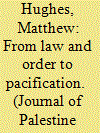

|
|
|
|
|
| Publication |
2010.
|
| Summary/Abstract |
This article examines British human rights abuses against noncombatants during the 1936-39 Arab Revolt in Palestine, contextualizing brutality in Palestine within British military practice and law for dealing with colonial rebellions in force at the time. It shows that the norms for such operations, and the laws that codified military actions, allowed for some level of systemic, systematic brutality in the form of "collective punishments" and "reprisals" by the British army. The article also details the effects of military actions on Palestinian civilians and rebels and describes torture carried out by the British on Palestinians. Finally, it highlights a methodological problem in examining these sorts of abuses: the paucity of official records and the mismatch between official and unofficial accounts of abuse during counterinsurgency.
|
|
|
|
|
|
|
|
|
|
|
|
|
|
|
|
| 4 |
ID:
103392
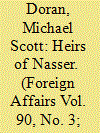

|
|
|
| 5 |
ID:
143129
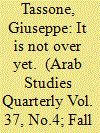

|
|
|
|
|
| Summary/Abstract |
In their assessment of the recent revolutionary turmoil in the Middle East, Hamid Dabashi and Tariq Ramadan argue that the Arab Revolution has opened up for the Arab peoples the possibility of reconnecting themselves with their own history. In their view, there is a creative potential in the Orient itself to question, from within its own tradition, the practices and conceptual categories by which the West has objectified it, so as to produce something new and original. In this article, I contend that Dabashi's and Ramadan's appeal to the Arab cultural tradition as a source of meaning for reconstructing Arab societies is a form of culturalization of politics that blots out the role played by political economy in the Arab Revolution. To gain a theoretical grip on this question, I suggest that the ties between culture and politics be severed and, in their place, the connection between the political and the economic be restored.
|
|
|
|
|
|
|
|
|
|
|
|
|
|
|
|
| 6 |
ID:
134220


|
|
|
|
|
| Publication |
2014.
|
| Summary/Abstract |
In the wake of the Arab Revolutions of 2011, countries in the Middle East are grappling with how Islamists might be included within a regime of democratic political pluralism and how their aspirations for an "Islamic state" could affect the citizenship status of non-Muslims. While Islamic jurisprudence on this issue has traditionally classified non-Muslims in Islamic society as protected peoples or dhimma, endowed with what the authors term "minority citizenship", this article will examine how the transnational intellectual Wasa?iyya or Centrist movement, of which Sheikh Yusuf al-Qaradawi is the figurehead, have sought to develop a new fiqh of citizenship in which Muslims and non-Muslims have equal civil and political rights. This article will focus on Yusuf al-Qaradawi on the basis that his very recent shift in 2010 on the issue is yet to be studied in depth, as well as in view of the fact that the dilemma faced by reformist Islamic scholars-how to integrate modern concepts into a legal tradition while simultaneously arguing for that tradition's continuing relevance and authority-is for him rendered particularly acute, given that this tradition is itself the very source of his own authority and relevance. It will therefore be argued that the legacy of the Islamic legal tradition structures his discourse in a very specific way, thereby having the potential to render it more persuasive to his audience, and worthy of a more detailed examination.
|
|
|
|
|
|
|
|
|
|
|
|
|
|
|
|
| 7 |
ID:
183763
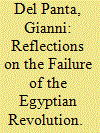

|
|
|
|
|
| Summary/Abstract |
Between January 2011 and July 2013, Egypt underwent a revolutionary period. While the roots and sequences of the Egyptian revolution have been studied comprehensively, much less has been said about the reasons behind the revolution’s defeat. The reason is twofold. On the one hand, scholars prevalently have explored democratization’s failure. On the other hand, the way in which Egyptian events were understood logically prevented the possibility of analyzing the 2011–2013 situation as an example of a failed revolution. By showing that the emergence of democracy was the most unlikely outcome and adopting an inter-social approach, the present article deals with the failure of social revolution in Egypt. In particular, it argues that the interaction between worldwide ideologies, epochal intellectual currents and (supposedly) successful contemporary revolutions on the one hand, and an internal context shaped by the legacies of Nasserism, the peculiar fate of the communist left and the institutional environment on the other, negatively affected the capacity of the subaltern classes even to outline an alternative political system. The non-emergence of popular bodies rendered unlikely the collapse of state apparatuses, making it impossible for revolutionaries to take power by extra-constitutional means and determining the defeat of the revolution
|
|
|
|
|
|
|
|
|
|
|
|
|
|
|
|
|
|
|
|
|